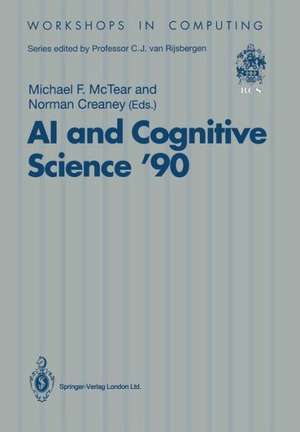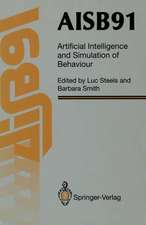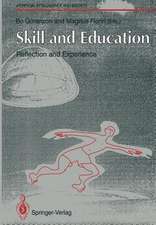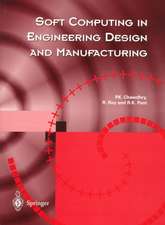AI and Cognitive Science ’90: University of Ulster at Jordanstown 20–21 September 1990: Workshops in Computing
Editat de Michael F. McTear, Norman Creaneyen Limba Engleză Paperback – 29 mai 1991
Din seria Workshops in Computing
- 20%
 Preț: 332.39 lei
Preț: 332.39 lei - 20%
 Preț: 333.22 lei
Preț: 333.22 lei - 20%
 Preț: 329.76 lei
Preț: 329.76 lei - 20%
 Preț: 336.54 lei
Preț: 336.54 lei - 20%
 Preț: 335.88 lei
Preț: 335.88 lei - 20%
 Preț: 333.54 lei
Preț: 333.54 lei - 20%
 Preț: 331.58 lei
Preț: 331.58 lei - 20%
 Preț: 327.77 lei
Preț: 327.77 lei - 20%
 Preț: 352.86 lei
Preț: 352.86 lei - 20%
 Preț: 330.10 lei
Preț: 330.10 lei - 20%
 Preț: 339.99 lei
Preț: 339.99 lei - 20%
 Preț: 339.34 lei
Preț: 339.34 lei - 20%
 Preț: 339.00 lei
Preț: 339.00 lei - 20%
 Preț: 335.88 lei
Preț: 335.88 lei - 20%
 Preț: 332.24 lei
Preț: 332.24 lei - 20%
 Preț: 332.06 lei
Preț: 332.06 lei - 20%
 Preț: 326.97 lei
Preț: 326.97 lei - 20%
 Preț: 333.72 lei
Preț: 333.72 lei - 20%
 Preț: 342.96 lei
Preț: 342.96 lei - 20%
 Preț: 644.66 lei
Preț: 644.66 lei - 20%
 Preț: 341.95 lei
Preț: 341.95 lei - 20%
 Preț: 330.75 lei
Preț: 330.75 lei - 20%
 Preț: 327.29 lei
Preț: 327.29 lei - 20%
 Preț: 339.80 lei
Preț: 339.80 lei - 20%
 Preț: 341.15 lei
Preț: 341.15 lei - 20%
 Preț: 336.35 lei
Preț: 336.35 lei - 20%
 Preț: 339.34 lei
Preț: 339.34 lei - 20%
 Preț: 335.88 lei
Preț: 335.88 lei - 20%
 Preț: 656.03 lei
Preț: 656.03 lei - 20%
 Preț: 330.56 lei
Preț: 330.56 lei - 20%
 Preț: 330.10 lei
Preț: 330.10 lei - 20%
 Preț: 336.67 lei
Preț: 336.67 lei - 20%
 Preț: 338.03 lei
Preț: 338.03 lei - 20%
 Preț: 345.44 lei
Preț: 345.44 lei - 20%
 Preț: 329.58 lei
Preț: 329.58 lei - 20%
 Preț: 337.20 lei
Preț: 337.20 lei - 20%
 Preț: 330.24 lei
Preț: 330.24 lei - 20%
 Preț: 336.54 lei
Preț: 336.54 lei - 20%
 Preț: 338.49 lei
Preț: 338.49 lei - 20%
 Preț: 333.54 lei
Preț: 333.54 lei - 20%
 Preț: 338.35 lei
Preț: 338.35 lei - 20%
 Preț: 332.57 lei
Preț: 332.57 lei - 20%
 Preț: 654.55 lei
Preț: 654.55 lei - 20%
 Preț: 334.53 lei
Preț: 334.53 lei - 20%
 Preț: 334.53 lei
Preț: 334.53 lei - 20%
 Preț: 334.05 lei
Preț: 334.05 lei - 20%
 Preț: 336.67 lei
Preț: 336.67 lei - 20%
 Preț: 334.53 lei
Preț: 334.53 lei
Preț: 340.98 lei
Preț vechi: 426.22 lei
-20% Nou
Puncte Express: 511
Preț estimativ în valută:
65.25€ • 70.86$ • 54.81£
65.25€ • 70.86$ • 54.81£
Carte tipărită la comandă
Livrare economică 22 aprilie-06 mai
Preluare comenzi: 021 569.72.76
Specificații
ISBN-13: 9783540196532
ISBN-10: 3540196536
Pagini: 412
Ilustrații: XV, 392 p. 18 illus.
Greutate: 0.65 kg
Ediția:1st Edition.
Editura: SPRINGER LONDON
Colecția Springer
Seria Workshops in Computing
Locul publicării:London, United Kingdom
ISBN-10: 3540196536
Pagini: 412
Ilustrații: XV, 392 p. 18 illus.
Greutate: 0.65 kg
Ediția:1st Edition.
Editura: SPRINGER LONDON
Colecția Springer
Seria Workshops in Computing
Locul publicării:London, United Kingdom
Public țintă
ResearchCuprins
Section 1: Artificial Intelligence — Tools and Methods.- What the Software Engineer Needs to Know About Al — and vice versa.- Developmental Support for Knowledge Based Systems.- Problem Description and Hypotheses Testing in Artificial Intelligence.- Section 2: Learning.- Machine Learning in Subject Classification.- A Test Bed for some Machine Learning Algorithms.- Section 3: Expert Systems.- Application of Expert Systems in Electrical Engineering.- Artificial Intelligence Applications in Geology: A Case Study with EXPLORER.- An Expert Assistant for High Frequency Electronic Circuit Design.- SWEEP: Social Welfare Entitlement Evaluation Program.- Architectural Issues in Knowledge-Based Signal Processing.- Section 4: Speech and Vision.- Neural Networks for Speech Recognition.- Using Observer-Controlled Movement and Expectations of Regularity to Recover Tridimensional Structure.- Measuring the ‘Rubber Rhomboid’ Effect.- Section 5: Cognitive Modelling.- Knowledge, Cognition and Acting in an Environment.- Section 6: Natural Language.- Natural Language Dialogues for Knowledge Acquisition.- Parsing English Directly into Propositional Representations.- SIMPR: Using Syntactic Processing of Text for Information Retrieval.- Very Large Lexicon Management System for Natural Language Generation.- Distributed Subsymbolic Representations for Natural Language: How Many Features do you Need?.- Section 7: Explanation.- Allowing Multiple Question Types to Influence the Resulting Explanation Structure.- The Construction of Explanations.- Section 8: Uncertainty.- Incomplete Information and Uncertainty.- Propagating Beliefs Among Frames of Discernment in Dempster-Shafer Theory.- Evidential Reasoning and Rule Strengths in Expert Systems.- Author Index.

















